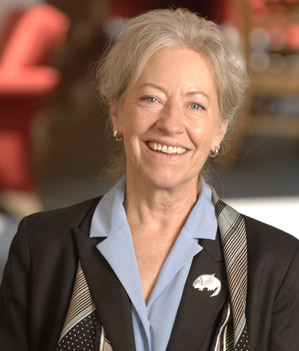The Legacy of Ann Wolpert
Ann Wolpert defined the research library’s role in a digital world.
Ann Wolpert, the director of MIT’s libraries and my boss and mentor, died on October 2 after a brief illness. Throughout her 17-year tenure as the Institute’s chief librarian, she wrestled with an absorbing issue: how should research libraries respond to the opportunities and challenges of the Internet? She is an inspiration to anyone who wonders, “Why can’t we solve big problems?”

Research libraries have a special role in our culture: they are the repository of our common intellectual heritage, and especially of scientific and technological literature. Ann asked whether the public should have unrestricted online access to the research published by scholarly journals. Most peer-reviewed journals have been published by large, highly profitable media businesses; and even though the research they publish is funded by taxpayers and written by scholars at universities, the journals can be read only by a few because they are so expensive. (Cell, for example, costs $253 a year for a U.S. subscription, and the Journal of Coordination Chemistry $12,991 a year.)
Publishers justified the prices as necessary to recover the costs of peer-reviewed publication, although scholarly publishing is hardly expensive. The reputations of the leading journals created a sort of “lock-in” for scholars. But most people felt there had to be a better, open, more digital way.
What was Ann’s solution? First, beginning in 2000, she worked with Hewlett-Packard to build DSpace, an open-source digital archiving system for research that has been adopted by more than 1,000 institutions around the globe. DSpace ensured that there would be a common, permanent platform for libraries’ materials. Then, in 2009, she conceived the MIT Faculty Open Access Policy, whereby journal articles written by the Institute’s professors are disseminated through DSpace@MIT. In turn, those articles can be republished on open-access websites like the Public Library of Science, or PLOS. It was the first university-wide policy of its kind in the United States and has been imitated by other institutions worldwide.
By the time of her death, her solution was generally accepted to be the likely future of research libraries (although there is still much we don’t know). She achieved her ends through patience, astuteness, technical creativity, and deep knowledge of the difficulties, but most of all through a spirit of collaboration. After all, it wasn’t enough to imagine the Open Access Policy: she had to persuade MIT's Academic Council to embrace the idea, guide the deliberations of a working committee, and convince the faculty to pass the proposal.
She was the chair of MIT Technology Review’s board of directors, and everything good we’ve done was achieved with her support and help. She was fair and intelligent and possessed of that rarest of qualities: discernment. She could turn a pretty compliment when we were deserving of praise but was otherwise blunt and specific in her criticisms. She always told me when I was about to make a mistake, and how I could avoid it. She had the slyest of wits. I couldn’t have wished for a better partner, and I don’t know what I’ll do without her.
Keep Reading
Most Popular
Large language models can do jaw-dropping things. But nobody knows exactly why.
And that's a problem. Figuring it out is one of the biggest scientific puzzles of our time and a crucial step towards controlling more powerful future models.
How scientists traced a mysterious covid case back to six toilets
When wastewater surveillance turns into a hunt for a single infected individual, the ethics get tricky.
The problem with plug-in hybrids? Their drivers.
Plug-in hybrids are often sold as a transition to EVs, but new data from Europe shows we’re still underestimating the emissions they produce.
Google DeepMind’s new generative model makes Super Mario–like games from scratch
Genie learns how to control games by watching hours and hours of video. It could help train next-gen robots too.
Stay connected
Get the latest updates from
MIT Technology Review
Discover special offers, top stories, upcoming events, and more.